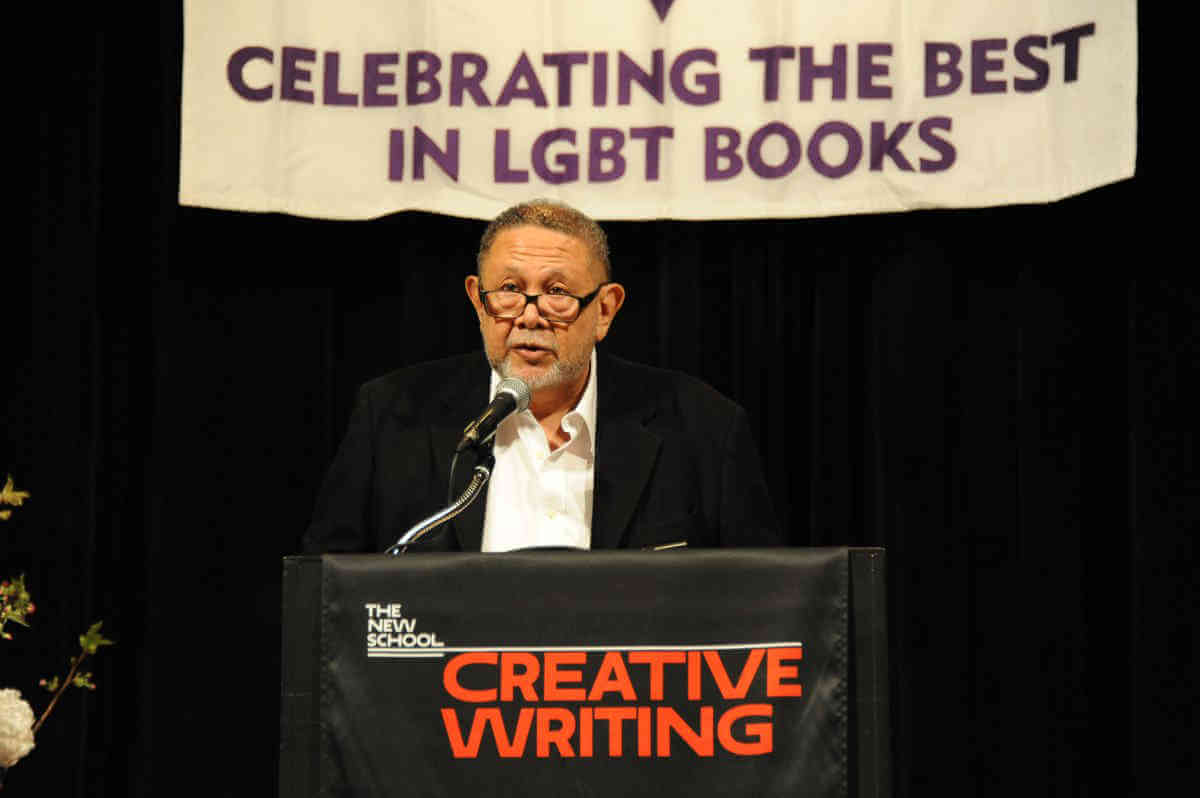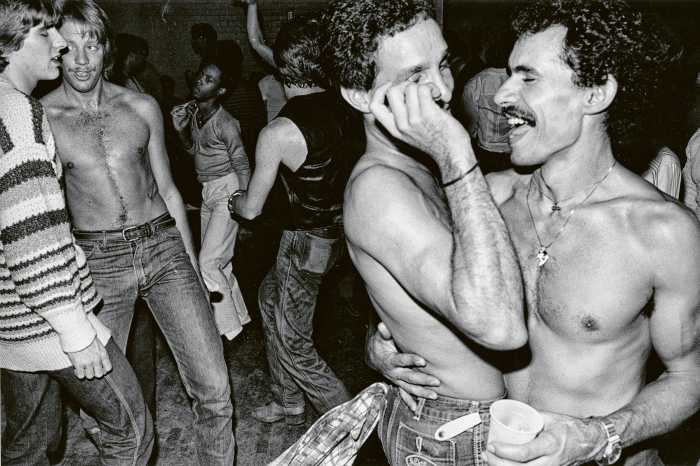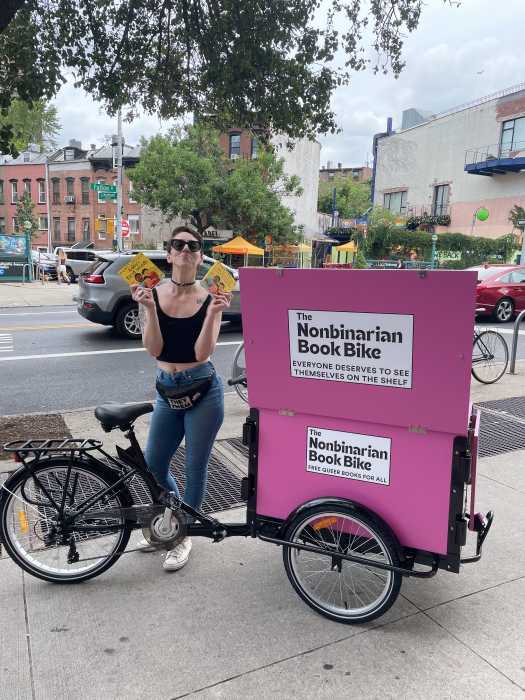There was a time a few years ago when the question “Do we need queer literature?” was seriously discussed. It is not a debate that comes up much nowadays.
The winners at the 31st annual Publishing Triangle Awards, held April 25 at the New School Auditorium — from the Emerging Writer recipient to the Lifetime Achievement honoree — all spoke about how essential it is for the queer literary community to speak out, loudly and passionately.
“Once more, the queer people of the world, indeed all of humanity, are under the threat of totalitarianism,” Jaime Manrique said in his acceptance speech for the Bill Whitehead Award for Lifetime Achievement. “That’s why we as writers must endeavor to write with our fingers and our minds afire. For wherever we find racism, homophobia, and misogyny entrenched, we must march toward that evil structure and tear it down.”
Manrique was honored for his distinguished career as a writer of fiction, poetry, and prose in both English and Spanish, which continues. His novel, “Like This Afternoon Forever,” about two Catholic priests in Colombia who fall in love, will be published June 4. Peter Cameron presented the award.
“All my dawns are resting on one trigger finger…” was the heart-stopping line of poetry that Teresa DeCrescenzo quoted when she presented the Betty Berzon Emerging Writer Award to “Living Queer Black poet from Chicago” Julian Randall.
When he was growing up, “to imagine I might be queer was a truly unapproachable thought,” Randall recalled. “To be queer is to be joined in the work of imagining such a thing.”
The Publishing Triangle, whose mission is “to further the publication of books and other materials written by LGBT authors or with LGBT themes,” presents three honorary and seven competitive awards for new work each year.
The honorary Leadership Award was presented to Paul Willis, longtime literary enabler and founder of the annual Saints and Sinners Literary Festival in New Orleans. Willis started S&S in 2003 “as an innovative way to reach the community with information about HIV/ AIDS, particularly disseminating prevention messages via the writers, thinkers, and spokespeople of the LGBT community.”
S&S has become an essential event for queer writers, readers, and allies each March, drawing participants from the US and Europe, and literary icons from Andrew Holloran and Dorothy Allison to Jewelle Gomez, among many others, for panels, workshops, readings, and friendship.
Willis spoke of the writers who have “found their tribe, and return each year to a place where people feel such connection.” He also talked about being attacked in his home city and losing an eye in the hate crime. His tribe, he said, gathered around him to help him recover and continue. Willis urged the audience of LGBTQ writers and readers to join the congregants “in the sultry streets of the French Quarter,” and know they will be welcome. Willis’s award was presented by Thomas Keith.

Nearly 30 books were finalists for the prizes in Fiction, Non-Fiction, Poetry, Trans & Gender-Variant Literature, and the Edmund White Award for Debut Fiction.
Jill Dearman and John Loughery presented the Non-Fiction Awards.
The Judy Grahn Award for Lesbian Non-Fiction went to “Looking for Lorraine: The Radiant and Radical Life of Lorraine Hansberry,” by Imani Perry. Imani Ford accepted the award for Perry, reading a message from the author: “I want to accept this award in honor of Nigel Shelby, a 15-year-old child who died by suicide exactly a week ago, in Huntsville Alabama. Nigel identified as gay, was bullied at school, struggled with depression, and was mistreated by a society that deemed him unacceptable, when in fact he was so beautiful that he shines luminously in every image that has circulated of him online. Seeing his face makes me smile and weep at once. Nigel was from the town my grandparents were from before moving to Birmingham.”
The Randy Shilts Award for Gay Non-Fiction went to “How to Write an Autobiographical Novel,” by Alexander Chee, who noted that the Publishing Triangle names the agent, the editor, and the publishing house when presenting the awards, saying that doing so “meant naming those who supported us. Because there were those who did not.”
Chase Berggrun presented the award for Trans & Gender-Variant Literature to “Some Animal,” by Ely Shipley. Stephen Motika accepted the award on behalf of Shipley, who sent thanks “to all the trans ancestors.”
The Ferro-Grumley Award for LGBTQ Fiction was presented by Stephen Greco and literary agent Malaga Baldi, and it went to John R. Gordon’s “Drapetomania.” The title is taken from a pseudoscience mental illness diagnosis offered by 19th century American physician Samuel A. Cartwright to explain enslaved Africans fleeing their captivity. Gordon’s novel, a narrative of two enslaved men, lovers who are separated, was the work of many years.
Martin Hyatt, the 2007 winner, presented the Edmund White Debut Fiction Award to “The House of Impossible Beauties,” by Joseph Cassara, a novel inspired by the drag and ball scene in Harlem in the 1980s.
Jerome Murphy and Christina Quintana presented the Audre Lorde Award for Lesbian Poetry and the Thom Gunn Award for Gay Poetry, with Quintana reading the Audre Lorde poem “Movement Song,” and Murphy reading Gunn’s “Considering the Snail.” Margaree Little won the Audre Lorde Award for her first poetry collection, “Rest.” “Not Here,” by Hieu Minh Nguyen won the Thom Gunn Prize, which was accepted by Julian Randall, who told the crowd, “He wants to thank queerness and his publisher. He loves all of you very much!”
As Randall said in his own acceptance speech for the Betty Berzon Emerging Writer Award, “For all of those who are waiting for the books that they need us to write, we are coming. We are writing as fast as we can.”































